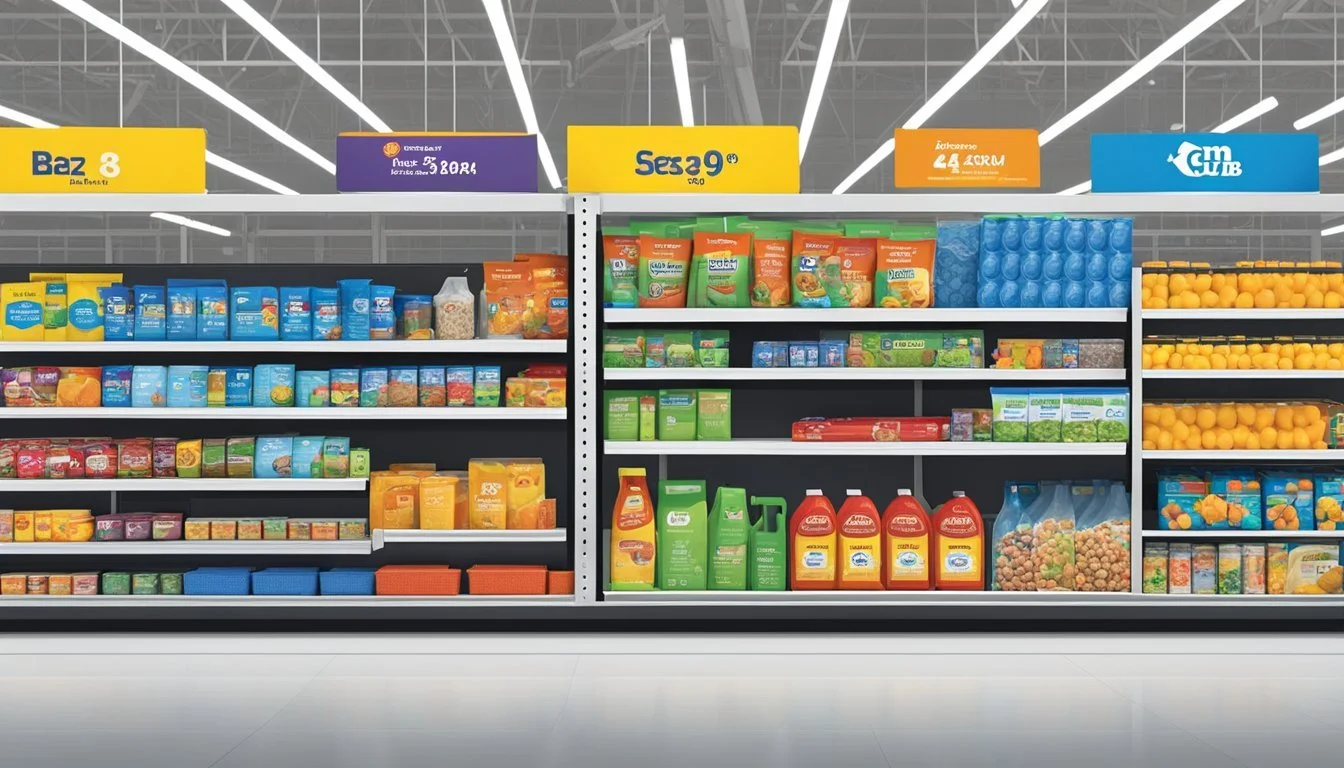Is Sam's Club Cheaper Than H-E-B?
Comparing Prices for Savvy Shoppers
Part of Our Grocery Store Guide with Details on Sam's Club Prices and H-E-B Prices
When comparing the pricing dynamics between two retail giants like Sam's Club and H-E-B, customers often look to get the best value for their dollar. Sam's Club, a subsidiary of Walmart, offers a membership-based experience that capitalizes on economies of scale to provide goods at lower prices. This often includes a wide range of products from electronics to pantry staples. H-E-B, a well-regarded regional grocery chain in Texas, presents a different business model focused on serving the local community with a mix of competitive pricing and specialty goods.
Sam's Club's advantage in pricing can often be attributed to its bulk-selling approach, which appeals to consumers looking for quantity and affordability. The warehouse club model allows members to purchase large quantities at what are typically lower unit costs compared to standard retail pricing. However, it's not just about the price per item. The membership fee, currently at $45 per year, is a factor that shoppers must amortize over their total savings to truly assess the value offered by Sam's Club.
On the other hand, H-E-B stakes its reputation on not only being a grocery store but an integral part of the local community it serves. With competitive pricing, it goes head-to-head with larger national chains on the shelves. While H-E-B does not require a membership fee, which arguably offers immediate savings to shoppers over a membership-based store, the per-item cost might be higher in some cases. The store balances price with a tailored shopping experience, offering products and brands that cater specifically to Texan tastes and preferences.
Understanding Warehouse Clubs and Supermarkets
When comparing warehouse clubs like Sam's Club to supermarkets such as H-E-B, one must consider their unique traits, from how they operate to the variety of products and services they offer, as well as the importance of membership fees and the physical accessibility of their locations.
Differences in Business Models
Warehouse clubs operate on a membership-based model, charging an annual fee to customers who, in return, gain access to a variety of goods at discounted prices. These bulk-sale focused entities rely on high-volume sales with lower profit margins. In contrast, supermarkets like H-E-B function without membership requirements, offering products individually suited for immediate consumption with generally higher profit margins.
Range of Products Offered
Warehouse clubs typically provide a wide range of products in large quantities, from groceries to electronics. Their inventory leans towards bulk items, which can offer better value for money but may require more storage space. Supermarkets offer a diverse array of food items, household goods, and often feature bakery, deli, and sometimes specialty services such as a pharmacy, but the quantities are more suited for regular household consumption.
Membership Strategies
The allure of warehouse clubs is largely due to their membership strategies; an upfront fee grants access to lower prices. Sam's Club, a subsidiary of Walmart, leverages the buying power of its parent company to offer competitive pricing. Membership fees can be a barrier to some consumers but are justified by the promise of overall savings.
Location and Accessibility
Warehouse clubs are often located on the outskirts of towns or in commercial districts due to their expansive physical footprint requirements. In comparison, supermarkets like H-E-B pride themselves on location and accessibility, situating stores strategically in both urban and suburban areas to cater to a broad customer base without the prerequisite of buying in bulk.
Pricing Structure Analysis
In assessing whether Sam's Club is cheaper than H-E-B, it is essential to consider various aspects of their pricing strategies. This includes looking at how bulk purchases affect pricing, the nature of sales and discounts, a direct comparison of their regular prices, and the value gained from their respective membership programs.
Understanding Bulk Purchases
Sam's Club operates under a warehouse model where customers can purchase items in bulk, often translating to lower prices per unit. In contrast, H-E-B, while it does offer some bulk items, typically gears its sales towards traditional quantities. As a result, bulk purchases at Sam's Club can provide more significant savings for customers who are able to buy and store large quantities.
Sales and Discounts
Both retailers offer sales and discounts, but they may apply to different types of products and at different times. H-E-B is known for its weekly deals and occasional "Combo Loco" offers, where purchasing one item might result in discounts on related items. Sam's Club regularly offers Member's Mark exclusives, and discounts on large-ticket items, potentially yielding higher savings on a single purchase.
Comparing Regular Prices
A direct price comparison of similar products shows that Sam's Club generally has a lower cost due to its focus on bulk selling and discounting through its membership model. However, for individual items or smaller quantities, H-E-B might offer competitive pricing, particularly when considering store-branded items over national brands.
Evaluating Membership Value
The membership model of Sam's Club entails an annual fee, providing access to their lower prices and member-exclusive deals. Customers who frequent Sam's Club can often recoup the cost of membership through their savings on purchases. H-E-B does not require a membership fee, which can be more accessible for shoppers who prefer not to commit to a long-term arrangement or those who shop less frequently. Comparing the two, customers should evaluate how often they shop and the volume they purchase to determine if the membership cost is justified.
Product Category Comparison
When comparing product categories between Sam's Club and H-E-B, consumers notably look at specific items that are essential in their regular shopping lists, such as staple groceries, household items, fresh produce, meat and dairy, and personal care items.
Staple Groceries
Sam's Club offers competitive prices for bulk staple groceries, which often includes items like rice, corn, and various canned goods. For instance, their large bags of rice tend to be priced lower per unit due to the quantities offered, making them a budget-friendly choice for shoppers stocking up.
Household Items
Toilet paper and diapers are commonly sought household items. Sam's Club, due to its affiliation with Walmart, often has lower prices on these items in bulk. This can lead to significant savings over time, especially for products like baby wipes, which are a frequent necessity for families.
Fresh Produce
When it comes to fresh produce, H-E-B is known for its quality and local sourcing. Their prices for fruits and vegetables, such as corn and assorted fruit, can be competitive with Sam's Club, though the latter may offer larger quantities at a discount.
Meat and Dairy
In the meat and dairy sections, Sam's Club usually has lower prices on items like meat, milk, eggs, butter, and yogurt when purchased in bulk. The store's advantage in purchasing power often translates into savings on these popular products.
Personal Care Items
The pricing for personal care items like shampoo, toothpaste, and soap can vary between the two stores. Sam's Club tends to offer more options in bulk packaging, potentially reducing the cost per use for consumers who are looking for larger quantities.
Membership and Services
When comparing Sam's Club and H-E-B, one must consider membership fees and the range of benefits and services offered. These factors play a critical role in determining the overall value proposition of each retailer.
Membership Fee Comparison
Retailer Standard Membership Fee Plus/Enhanced Membership Fee Sam's Club $45 $100 H-E-B No membership fee N/A
Sam's Club charges an annual membership fee of $45 for their standard option, whereas their Plus membership, which provides additional benefits, costs $100 annually. In contrast, H-E-B does not require a membership fee, as it operates as a traditional grocery store accessible to the general public without a paid membership plan.
Membership Benefits
Sam's Club members enjoy various benefits such as bulk purchasing options, members-only pricing, and access to exclusive in-club deals. Plus members receive additional perks including:
Free shipping for online orders with no minimum purchase
Early shopping hours
2% cashback on qualifying purchases
H-E-B offers its shoppers savings through weekly ads, digital coupons, and promotional discounts without the need for a membership.
Additional Services Offered
Sam's Club provides a broader selection of ancillary services which can enhance a member's experience. These services include:
Pharmacy access with discounts on select generic prescriptions
Optical services with added savings for Plus members
Members-only fuel savings
Insurance options for health, life, and more
H-E-B, while not offering a membership-based model, still provides a range of services such as a pharmacy, cooking demonstrations, and curbside pickup/delivery to enhance their customers' shopping experience. However, they do not provide the membership-centric services like bulk buying or exclusive membership discounts that Sam's Club offers.
Shopping Experience
When comparing Sam's Club and H-E-B, shoppers may notice differences in the ease of navigating the store's layout, the accessibility of online and app features, as well as the level of customer service provided. These aspects can significantly influence a consumer's overall shopping experience.
Ease of Shopping
Sam's Club, known for its large warehouse format, offers customers a broad range of products in bulk. The spacious aisles are designed to accommodate large carts, making it easier to shop for huge quantities. H-E-B, on the other hand, provides a more traditional grocery store setup with well-organized sections tailored to quick and frequent purchases.
Sam's Club: Wide aisles, bulk purchases
H-E-B: Traditional layout, organized sections
Online and App Accessibility
Both retailers offer apps and online services to enhance the shopping experience. Sam's Club's app includes features like Scan & Go, allowing customers to scan items and pay directly on their phone, reducing checkout time. H-E-B's app provides a seamless interface where customers can create shopping lists, view promotions, and access curbside pickup and delivery options, simplifying the shopping process.
Sam's Club App:
Scan & Go
Online shopping
H-E-B App:
Shopping list creation
Access to services like curbside pickup and delivery
Customer Service Quality
Customer service is an essential aspect of the shopping experience. Reports suggest that Sam's Club, leveraging Walmart's infrastructure, focuses on efficiency and self-service options. H-E-B, widely recognized in Consumer Reports and other surveys, is celebrated for its customer-focused approach, often providing a more personalized shopping experience with staff readily available to assist consumers.
Sam's Club: Efficient, self-service oriented
H-E-B: Personalized customer assistance, highly rated in surveys
Expert and Consumer Insights
In analyzing whether Sam's Club is cheaper than H-E-B, both expert evaluations and consumer insights provide a clear view of the potential savings. These insights focus on the direct comparison of costs, the specifics of savings found in consumer reports, and firsthand accounts from shoppers.
Consumer Reports Analysis
Consumer Reports consistently reviews and compares retailers for value and savings. They often evaluate the cost per pound or per item to determine which store offers the lowest prices. According to this metric, Sam's Club frequently undercuts competitors on a range of bulk items, although individual product comparisons can vary between retailers.
Savings Calculations
Experts look at overall savings calculations by tallying up the totals on typical grocery lists. Savings can be significant at Sam's Club, especially for bulk purchases. Shopping at Sam's Club may result in a noticeable reduction in the total cost for consumers who are able to buy in larger quantities and take advantage of the bulk pricing that Sam's Club offers.
Grocery List Comparison Example:
Sam's Club: $200 for bulk items.
H-E-B: $250 for equivalent items in smaller quantities.
Shopper Testimonials
Shoppers often express their experience with the savings they achieve. One shopper might report saving upwards of 40% on specific categories such as health and beauty when shopping at Sam's Club compared to other retailers. Another shopper might highlight the ease of finding lower prices for bulk items at Sam's Club, something they didn't encounter at H-E-B for the same volume of products. These anecdotal evidences strengthen the claim that Sam's Club offers significant savings for bulk purchases.
Final Verdict
When comparing the price factor between Sam's Club and H-E-B, a thorough examination of the costs associated with each retailer is crucial for a conclusive verdict.
Who Is the Winner?
Sam's Club often emerges as the winner in a direct price comparison for consumers who buy in bulk. This advantage is primarily due to its business model which emphasizes bulk buying, providing savings on a per-unit basis. The club offers significant rebates and promotions on a variety of products, further lowering the expenses for its members. H-E-B, while offering competitive pricing, does not specialize in the same bulk format.
Item Sam's Club Price H-E-B Price Winner Bulk Chicken Breast Cheaper More Expensive Sam's Club Paper Goods Cheaper More Expensive Sam's Club Perishables Varies Varies Shop Around
Sam's Club does not typically price match with grocery stores like H-E-B as their business models differ. However, shoppers seeking smaller quantities and a localized shopping experience might find better deals or clearance items at H-E-B on occasion.
Tips to Maximize Savings
To further enhance savings, shoppers should:
Shop around to see whether Sam's Club's bulk offerings represent the best deal compared to H-E-B's prices on smaller quantities.
Take advantage of clearance sales and in-store promotions at H-E-B, which may sometimes offer better savings than Sam's Club's bulk pricing.
Explore both stores to understand where each one provides the most value — Sam's Club might be better for non-perishable goods while H-E-B could offer competitive pricing on fresh, local products.









